Interview with Suzanne Willow, Co-Owner of The Forest Conservation Burial Ground
By Chris Cook, Capiche, capiche.us President and CEO of Capiche & Capiche Wine, Chris Cook is a leadership coach focused on happiness, culture, living your brand, and winery marketing & PR. She brings decades of experience in marketing and a love of entrepreneurship.
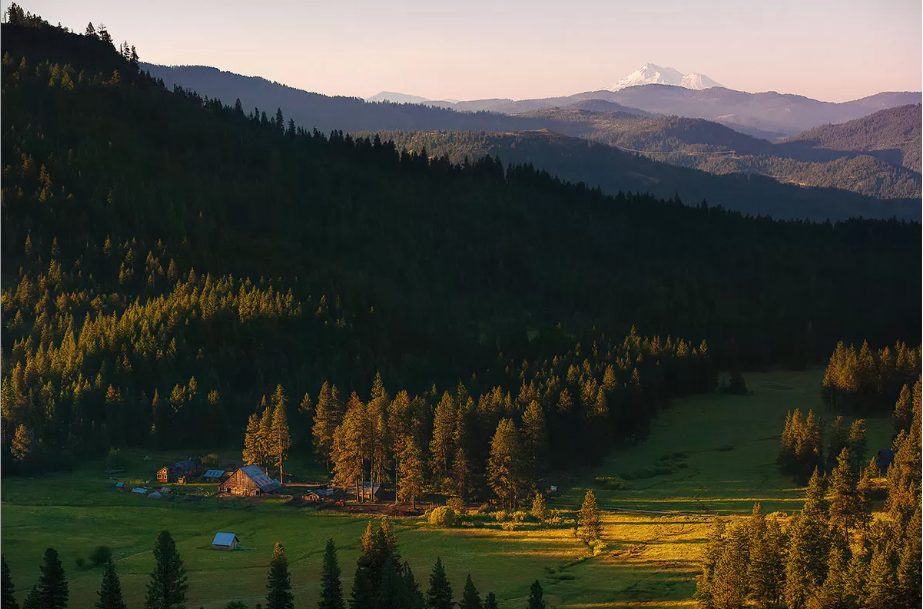
INTERVIEW CONDUCTED BY MELISSA L. MICHAELS, CAPICHE CONTRIBUTOR/STRATEGIC PARTNER, MICHAELS & MICHAELS CREATIVE, LLC
Where would you like to spend your death? Do you want to return to the earth, becoming part of nature in a way that continues to nurture the life around you? Would you like to be enveloped in the beauty of the forest, cradled in a magnificent landscape where your loved ones can return to celebrate your life until it is time for them to join you?
The first dedicated natural burial ground in Oregon, The Forest Conservation Burial Ground represents a transition from destructive chemical processes to more ecologically responsible, green methods of burial. Located just outside Ashland, Oregon, within the Cascade-Siskiyou National Monument, The Forest offers a majestic final resting place while fulfilling its mission “to provide a space to reconnect our human experience of life and death with land conservation.”
Capiche’s Chris Cook became involved with The Forest early in its development, providing key marketing, public relations, research, and video production services that positioned the organization to succeed in its meaningful work.
Q: The Forest Conservation Burial Ground is the first of its kind in the state of Oregon. Can you describe The Forest and the inspiration behind creating it?
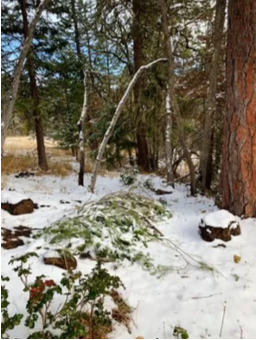
A: The Forest Conservation Burial Ground is the first dedicated natural burial ground in Oregon. There are other “traditional” lawn cemeteries (what Americans usually picture when they think of a cemetery) that allow “natural” burial among standard burials. The Forest, however, is the first to specify the return of bodies to the earth in a way that specifically does not interfere with decomposition. We do not allow embalmed bodies; concrete or plastic vaults; metal; or exotic wood caskets. Bodies are interred in natural fiber shrouds or simple unfinished wood caskets. The grave is hand-dug three to four feet deep so the body remains in the biologically active layers of soil, fostering decomposition and mycelial activity. The soil is then carefully returned to the grave in the strata from which it came.
My wife, Lanita Witt, and I have always known we wanted to return to the earth on this piece of land. We were encouraged by a small group of people who wondered if they could also be buried here. Thus, this journey began.
Q: Reciprocity is at the heart of The Forest’s mission. What does reciprocity mean to you and those who choose this final destination for themselves and their loved ones?
A: At the heart of reciprocity are acknowledgment of the gifts the earth gives us and a desire to return the gifts we receive. Reciprocity calls us to live in gratitude and awareness of our dependence on the health of the earth. Our culture of extraction is the opposite of a culture of reciprocity. The cemetery enables us to conserve the land, and the act of returning our bodies to the earth in a respectful and low-impact manner is an ultimate act of reciprocity.
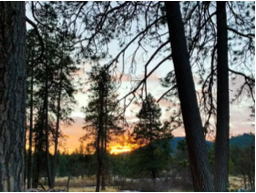
Q: What is special about the location of The Forest?
A: This valley property was formed by volcanic activity 20 million years ago and has some areas that are very rocky with thin soil. In any ecosystem, there are areas where trees grow well, others that hold water in the wetland and are suited for meadows and willows, and still other areas that have naturally thin soil. We selected this site for The Forest because it is suited both in location and soil types. Distanced from the day-to-day workings of the farm and guest areas, the location allows quieter, private access. The land where we placed the cemetery does not have deep, fertile soil; is outside the wetlands; is not prone to sliding or slumps; and will not rapidly grow new trees. It will remain fairly stable into the future.
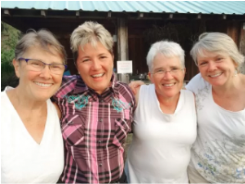
Q: Chris Cook started working with The Forest shortly after its genesis. What was her role?
A: Chris began working with us about a year ago. We needed advice on marketing, and she helped us develop an overall marketing plan and started us in a good direction. She handled strategy, research, and initial PR work. She continues to provide consulting services as needed. Chris also helped us produce a video and get some media attention at a time that was particularly challenging due to COVID blowing up the news. Chris got us positioned in such a way that our in-house team could assume marketing and PR responsibilities.
Q: What are the responsibilities of your sexton, Mary Ann Perry, and how did her background prepare her for this position?
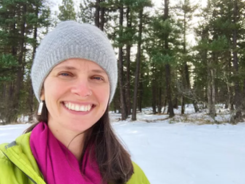
A: Mary Ann joined our burial planning team in January 2019. She has been connected to the Ranch for many years and was married here in 2014. Mary Ann’s life experience led her to become a home funeral guide and green burial educator in her spare time. She has long been passionate about community education on end-of-life and after-death care topics. Empowering families to make informed choices is a pleasure for her. When we opened in June 2020 and needed to hire a sexton, Mary Ann was ready and willing. The role is varied, from supporting burials and guiding tours to community presentations and marketing. She has been learning this role along with us, and she loves this work because it aligns with her values.
Q: Willow-Witt Ranch was founded in 1985. Tell us about the ranch and how you practice stewardship of the land.
A: After Lanita and I purchased the land in 1985, we began experiencing the unique ecosystem that exists on this piece of the earth. We have always been called to share the magic of this environment with others. As we learned more of the natural history and ecology of this land, we felt driven to conserve the healthy functioning aspects of the ecosystem and work toward regenerating the systems that were out of balance.
We have continued this practice, and The Forest is a natural extension of this desire to protect and regenerate the ecosystem. Our stewardship activities in the natural burial cemetery and on the farm include regenerative certified organic farming; rotational pasture management for our chickens and small goat dairy; selective forest regeneration; and wetland function restoration. We have established a nonprofit, The Crest, for environmental education aimed at reconnecting people of all ages with conservation of the water, forest, and earth. We nurture the interdependence of The Forest, The Crest, the small farm, and the ecosystem in this small valley.
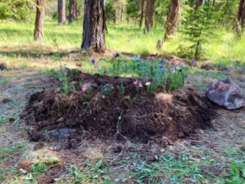
Q: How does green or natural burial differ from traditional methods, and why are more people gravitating toward this new approach?
A: Green, or natural, burial involves returning a body to the earth in the simplest way possible: without embalming fluid, grave liner, vault, metals, or plastics. Green burials that support land conservation take this a step further by ensuring all aspects of the burial process focus on care of both the body and land. It is not surprising that people are drawn to this approach, although there isn’t anything new about it. This is how burial has been conducted for thousands of years by most people around the globe. Many are simply beginning to understand that there are good reasons to do no harm in the process of laying our loved ones to rest and that cremation isn’t the most environmentally friendly alternative to conventional burial.
Q: Why is natural burial a more ecologically responsible choice than cremation? Do you accept cremains if the family so chooses?
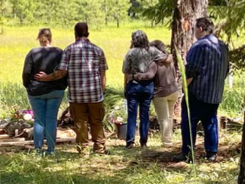
A: We do accept cremated remains for burial and scattering at The Forest, knowing cremation is the right choice for some. With cremation, the environmental impact is air pollution of heavy metals and CO2. In the United States, the amount of fuel used annually for all cremations would provide enough fuel to drive halfway to the sun, according to the Green Burial Council (GBC). With natural burial, our bodies can actually give back to the life that’s continuing around us.
Q: What can a family expect when their loved one passes away?
A: Burial at The Forest literally means burial in the forest. One helpful tip I recently heard is to “wear sensible shoes.” Whether families choose to host a home funeral and handle after-death care arrangements themselves or they hire a funeral home for some or all of the arrangements, the drive to the burial ground is the first opportunity to transition into another space. It can be soothing to mark each transition of this process with silence, song, or prayer. We welcome the family’s participation in all aspects of the burial process, including the digging of the grave, the procession with the body, creating a ceremony together, lowering their loved one into the earth, and closing the grave. We also invite families to return to the burial ground at their leisure. The grounds are open every day from dawn to dusk, and it is a lovely place to hike, bird-watch, meditate, picnic, and simply visit.
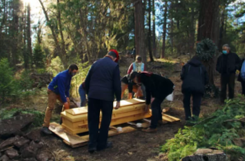
Q: The interment process itself can be a beautiful spiritual experience and part of the grieving/healing process. Family members are welcome to help hand-dig the grave with The Forest’s staff or leave it to staff completely. As you mentioned earlier, the soil is removed in layers and returned to the grave in the same strata as part of your commitment to land conservation. How do family members react to this unique experience?
A: One of the elements we love about burial at The Forest is we are truly able to meet families where they are. The nature and circumstances of the death—and, of course, personal preference—all impact a family’s ability and desire to actively participate. We are open to what makes sense in each unique scenario. Some family members and friends are most comfortable witnessing, and others want a hands-on experience. Our intention is to offer support and maintain the integrity of the green burial.
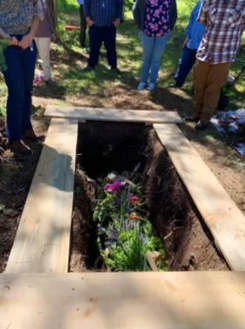
Q: The Forest is about far more than the burial and memorial services. It’s a place for celebration, remembrance, and healing. Tell me about the holistic philosophy behind embracing this sacred space as a place to enjoy during life.
A: Our mission at The Forest is to provide a space to reconnect our experience of life and death with land conservation. While grief and sadness are real and valid, it is difficult to ignore the fact that life is continuing when one is standing in the middle of a beautiful forest. The burial ground and the whole of Willow-Witt Ranch are full of life-affirming activities that are all equally relevant to the cycle of life and death. We know healing the land through conservation also means we are healing ourselves—whether through mourning a loss or celebrating a union.
Q: The Forest represents a return to the pre-1950s funeral home industry, before the time of embalming and toxic chemicals and artificial materials. Families used to picnic in cemeteries and return often to remember their loved ones. How has the burial and cremation industry transformed over the past century, and why is it so important to embrace a new model like The Forest?
A: In general, end-of-life and death care has moved out of the hands of families and friends and into the hands of paid professionals. This has happened for a variety of reasons, not the least of which is our death-phobic culture. Green burial at The Forest offers another way, which in some respects constitutes a return to the past but is also an orientation to what makes it possible now. Embracing natural burial is a way to get closer to the realities of death, see the continuation of life, and make a conscious choice to do no harm with our bodies as we lay them to rest.
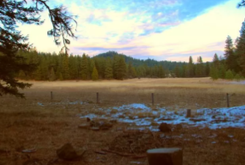
Q: People can pay a little more to choose the location of their plot—whether it be in the woods, the meadow, on a little hill, in a sunny or snowy spot. How does the selection process work for those who prepurchase a plot?
A: For some, choosing the exact location where your body will be buried is important and meaningful. For others, it simply doesn’t matter, so long as they are in The Forest. We do offer plots on the edges of the meadows, but the meadows themselves are protected wetlands where we won’t be offering burials. We encourage those interested in burial at The Forest to experience the space in person, but visiting the land isn’t necessary or an option for everyone. It is not a prerequisite to purchasing a burial plot. Of the 18.4 acres of the cemetery, just a few acres have been surveyed and are open for burial. And yes, while it’s all a forest, each little nook calls to people in different ways.
Q: How can people be confident the land and their plots will be cared for in perpetuity?
A: Willow-Witt Ranch focuses on conservation of the property and restoration of the ecological balance within the ecosystem. Oregon is unique in that it allows stewardship trusts for purpose-driven businesses to direct the mission, purpose, and running of businesses in perpetuity. The stewardship trust has a business (in this case, the land and businesses) as the trustee; the trust is overseen by a stewardship board, which is directed to follow the purpose for which the trust was established. The cemetery is deed-restricted—the property of the cemetery can never be developed or taken out of cemetery status.
Q: You recently added the Pet Cemetery. Can people be buried with their beloved animals if they wish to do so?
A: We do offer burial plots on the edge with the Pet Cemetery for those who want to be next to their beloved furry family members. We also welcome cremated pet remains to be buried with their human companion at the time of the human’s interment. We do not allow burial of full pet bodies in the human burial ground areas.
Q: How do you protect the plots from scavengers and other potential threats?
A: All bodies, whether in a container or shroud, are covered with at least 18 inches of soil. This creates a smell barrier for animals. According to the Green Burial Council, there aren’t any instances of animals digging up a grave. The GBC has a great FAQ that answers this and a lot of other common questions about green burial.
Q: What options are available for gravestones or markers?
A: Grave markers are optional at The Forest. We do place a simple survey-type marker on top of each burial engraved with name, birthdate, and death date. Stone markers sourced from the land of the ranch are available for purchase for those who desire this. We also offer memorial benches and the planting of native shrubs.
Q: Do you have special discounts for veterans or other groups?
A: We offer payment plans as well as a 5-percent discount for those who purchase a plot in full. We are building a Community Support Fund to promote equitable access to burial at The Forest.
Q: I understand you’ve been running Zoom webinars, which have been very well-received. What kind of information do you present, and how would someone go about viewing or participating in one of these webinars?
A: We have collaborated with several other groups in offering green burial community education. It has been a joy to work with the Unitarian Universalists of Grants Pass, Ashland Senior Center, and The Peaceful Presence Project in Bend.
We have upcoming presentations with Jackson County Library Services and Deschutes Public Library, both on July 14. People can visit the libraries’ Events pages to register.
These presentations focus on green burials in general, and we share a little about The Forest, too. For those who want to visit in person, we offer community group tours of the burial ground every first Saturday and Wednesday of the month, May through October. Registration is through our website.
Q: You have an open house coming up on Memorial Day weekend for people who have purchased a plot already as well as for family members who’ve had people buried there. You’re also planning another open house for the general public. Can you provide details about those events and how people can sign up?
A: Yes! We are so excited to finally be opening our doors to the (masked and distanced) community. The Memorial Day “Time of Remembrance” is a special invitation to plot owners, those interested in purchasing a plot, and especially families and friends of loved ones interred at The Forest. There will be tables and chairs for family picnics, self-guided tours, and a remembrance activity. Families are welcome to visit any time from dawn to dusk, and staff will be onsite from 11 am to 1 pm.
Our Opening Blessing Ceremony is our public opportunity to bless the land and honor this resting place together. This summer solstice celebration is from 4–7pm on Sunday, June 20. Registration is not required for either event.
Q: How has The Forest changed your understanding of and feelings about death?
A: We have always felt that we, as humans, are a part of nature—not separate from or superior to the natural world. A deeper appreciation of death and burial has brought us even closer the cycles of nature and life/death, living/dying. Placing a beloved family member in the accepting and encompassing earth clearly becomes a returning “home.” Natural burial does not erase the sting of death, but it helps ease the sadness, loss, and pain and brings a sense that we really do belong to nature and are one with the earth.


Advertisement